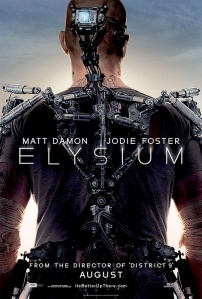In the year 2154, Earth has been ravaged by disease, pollution, overpopulation, and widespread poverty. The planet is dotted with slum cities where residents (predominantly people of color) live without access to adequate medical care, or access to employment, and they are closely monitored by brutal robot sentinels.
Decades ago, the extremely wealthy had fled to an artificial satellite world called Elysium where they live in luxurious mansions, have daily pool parties, and have access to instantaneous and highly advanced medical treatment.
For the right dollar amount, citizens of Earth can make a break for Elysium, despite risks of arrest and death. Elysium after all is highly exclusive (and overwhelmingly white).
The protagonist Max De Costa is born into this world of steep class divisions and when he finds himself in desperate need of medical aid, he must risk everything to break through them.
But this movie isn’t really about Max.
The opening scene is of a mother with her young daughter crowding into one of several junkyard shuttles before they hurtle desperately toward the glowing beacon of Elysium. Only one shuttle makes it through. The mother runs through gunfire and explosions before bursting through expensive French doors to place her child in a medical pod (a standard amenity in Elysium housing). The machine scans the girls’ false ID and instantaneously cures her debilitating bone disease, just seconds before both mother and daughter are subdued,taken into custody, and presumably killed.
If all of this hits a little close to home, director Neill Blomkamp has done his job. Blomkamp also directed District 9, a movie ostensibly about aliens that actually went on to reveal the dehumanizing effect of racism on victims and perpetrators alike. With Elysium, Blomkamp has definitely established himself as a pro at social critique allegories wrapped in explosions (so people will actually go see them).
The opening scene struck me immediately because this wasn’t the year 2154, this was here and this was now. While we were sitting in an air conditioned theater shaking our heads at the awful conditions portrayed on the screen, sympathizing with the characters, and booing the villains; these events and struggles were going on all around us!
The movie was all about the very real issues of immigration, healthcare, and classism as it exists and has existed and probably will exist into the foreseeable future. If you want to see dystopia you need go no further than the daily news.
So why are these issues more striking on a movie screen, acted out by celebrities, and covered in a veneer of special effects?
Is there a better platform for these issues stripped of the glitz and the glamor?
If you saw the movie, what did you take away from it?
4/5 ticket stubs!

